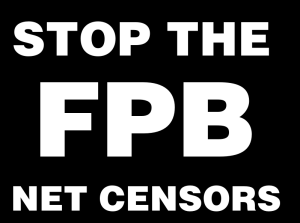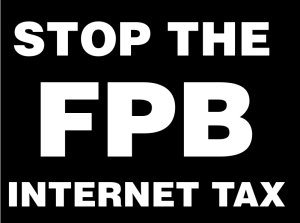PRE-PUBLICATION NET CENSORSHIP ENVISAGED BY THE FPB WILL CREATE ENORMOUS BURDEN OF REDTAPE, THE TERABYTES OF INFORMATION ON THE NET WILL NEVER BE CLASSIFIED UNDER THE PROPOSED SYSTEM WHICH IS UNWORKABLE, SINCE IT REQUIRES ENORMOUS LABOUR-HOUR CAPACITY BY THE DEPARTMENT WHO VIEW CONTENT PRODUCERS AS POTENTIAL FEE DONORS, THIS REPRESENTS A TAX ON THE INTERNET!
UNDER THE PLAN, EACH AND VERY PIECE OF MEDIA UPLOADED ONTO THE NET WOULD HAVE TO BE FIRST SUBMITTED TO THE DEPARTMENT OF FILMS AND PUBLICATIONS UPON PAYMENT OF A FEE, IN ORDER FOR THE DEPARTMENT TO CLASSIFY THE MATERIAL, THIS REPRESENTS A SERIOUS BLOW TO INTERNET FREE-FLOW OF INFORMATION.
INTERNET CONTENT PRODUCERS WHO FAIL TO DO THIS, WILL BE TURNED INTO CRIMINALS!
SOCIAL MEDIA FEEDS AND BLOGS WILL BE SUBJECT TO THE ACT, WHICH RECKLESSLY ENVISAGES AN ETOLL.
SOUTH AFRICA’S SECUROCRAT CABINET HAS ALREADY APPROVED THE FPB BILL WHICH IS BEFORE THE NATIONAL ASSEMBLY.
WE CAN STOP THIS NET TAX WITH YOUR HELP!
SIGN THE R2K CAMPAIGN PETITION ON CHANGE.ORG

A response from an Arts and Culture perspective
The Film and Publications Board is a public entity that falls under the Department of Communications and was created to regulate the creation, production and distribution of films, games and ‘certain publications’ through classifications. It has put an argument forward that South Africa has seen an increase in the use of portable devices for gaming and social networking which has been economically beneficial, but also ensures a proliferation of illegal content in and the abuse of social media platforms. According to the FPB, these instances amount to a threat to the nations’ morality and stand to undermine the government’s agenda on social cohesion. In response, they have suggested new regulations that allow the FPB considerable power to exercise prior restraint in terms of almost all forms of content that gets produced and published online.
To quote the Right to Know Campaign, “The FPB wants broadly defined powers to police everything published on the Internet – including blogs, personal Web sites and Facebook pages, which amounts to censorship and is a violation of freedom of expression.“ This would be achieved through a) the requirement that anyone who wants to publish or distribute content to first apply for a digital publisher’s online distribution agreement with the FPB, which will require a subscription fee. After that step, the publisher then has to submit the content to the FPB for classification before publishing (http://www.r2k.org.za/2015/03/10/statement-stop-the-film-and-publications-boards-attempt-to-censor-the-internet/).
As the African Arts Institute. we would like to put forward the following four points in the strongest terms possible:
1) The proposed regulations are unconstitutional in as far as they contradict the right to freedom of speech by implementing the globally discredited notion of ‘prior restraint’ (this is at odds with Section 16 (1b) in the Bill of Rights. Pre-publication censorship is a concept which has already been thrown out by our Constitutional Court in regards to the press).
2) Second, any system of prior restraint is costly, time-consuming and wholly implausible. The terabytes of information on the Internet could never be vetted in real time by any human censor board. The backlog itself would lead to absurdity and the rest of the world would reject us as an online destination in terms of client-services.
3) Third, proposed regulations allow the state to assume to role of a moral guardian and parent, this presents a contradiction to the freedom default in our Bill of Rights. The state is an unfit parent for the censorship and moral policing of the content and expression available in contemporary forms of communication in South Africa. The FPB, in its regulations, appears to raise a number of important points about the nature and limits of free speech and what the internet and instant communication has done to such debates.
It mentions for example that “in 2014 cases related to freedom of speech increased from 3% to 22% of the more than the 10 000 cases dealt with by the Human Rights Commission. Furthermore, social media platforms such as Facebook and Twitter contributed to this increase and appear to have shifted the discourse of free speech. These cases are often complex, containing elements of racism, poverty, ignorance and misguided hatred.”
Sadly however, the proposals do not suggest democratic ways to move these debates forward and establish mechanisms for the empowerment of family structures. Parents are better equipped than the state to make decisions concerning children and the Internet, and the FPB should rather provide guides for protection of children . Ultimately the regulations cannot practically prevent the distribution of content that may be harmful to children. Laws against child pornography already exist and do not necessitate a system of prior restraint and censorship.
4) Many commentators have compared the bill to apartheid-era censorship regulations that contradict the democratic culture, openness and freedom of post-apartheid South Africa. The cases outlined by the board in no way present a security threat that calls for such drastic measures. Freedom of expression and media freedom are cornerstones of democracy and efforts to restrict these present a threat to the entire social system. Artists and creative practitioners, have a social role to reflect and comment on society, to agitate, provide relief, joy, curiosity and amusement and to critique the status quo. Their role is critical in the societies ability to understand itself, its past and develop a shared future.
These regulations hold a particular threat for the work of artists and creative practitioners (from dancers to journalists), whose work is often to question what is moral, to provoke critical thought and to expose unpleasant realities. Such content cannot be subject to prior restraint and pre-publication censorship without undermining the very core of creative work. If adopted the regulations would have a chilling effect, both on the production of content and the freedom upon which our economy is based. This is definitely not the open society that we voted for in 1994 and certainly not within the spirit of the constitution and the culture of the freedom struggle which created it. The bill must be rejected.
The African Arts Institute also supports the Right to Know Campaigns in some of the main concerns that these regulations raise which are around:
a) The time consuming nature of the proposed regulations: pre-classifying content undermines immediacy of online content.
b)The democratic nature of the internet, which allows open publication access to anyone who can get online, and thus ensures an enormous diversity of content, would be undermined by the bureaucratic conditions of subscription fees and distribution agreements.
c) The suggestion that the FPB would be able to conduct its classification work in cases deemed necessary to distributors’ premises to classify digital content is a draconian suggestion that places enormous power in the hands of the state to invade the physical privacy of its citizens with little evidence of the threat that would call for such action.

